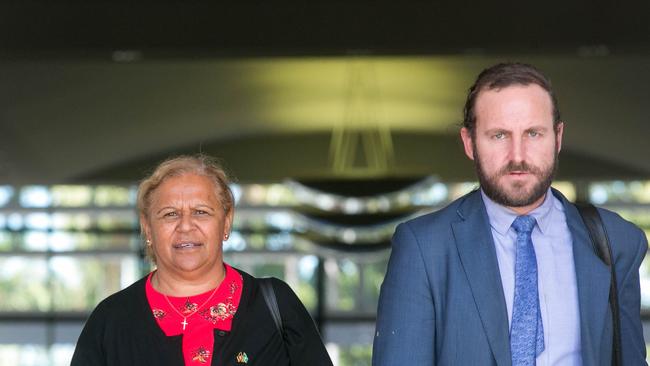Car dealer targeted indigenous buyers with 48pc loans after cyclone
The royal commision yesterday heard tales of banks charging overdraft fees to disadvantaged Aboriginal customers.

Banks charging overdraft fees to disadvantaged customers, life insurers using pressure sales tactics to push policies on Aborigines and Torres Strait Islanders and dodgy car dealers exploiting relief payments made to Cyclone Yasi victims with sky-high interest rates on loans.
These were some troubling tales heard by the new chairman of the Australian Securities & Investments Commission, James Shipton, at the Northern Territory Supreme Court, when he dropped by to observe hearings for the banking royal commission’s probe into the gouging of indigenous customers.
Mr Shipton, who took charge of the securities regulator in February, was in Darwin meeting with the ASIC regional commissioner, Duncan Poulson, and listened to the first half of proceedings yesterday.
In one instance, the royal commission heard a car dealer in far north Queensland targeted indigenous car buyers with interest rates of 48 per cent — the maximum legal interest rate — for second-hand cars brought into communities outside Cairns in the wake of Cyclone Yasi, when the dealer knew people in the communities had recently received relief payments of between $2000 and $3000.
Customers would default on the repayments under the loan, and the car would be repossessed and then resold to other members of the community, said Nathan Boyle, policy analyst for ASIC’s Indigenous Outreach Program.
Mr Boyle said a lot of customers believed that the higher the interest rate charged on a loan, the better the terms were for the consumer. “If people can’t understand interest rates, it means they have difficulty understanding other financial products,” he said.
Royal Commissioner Kenneth Hayne interjected at one point to ask if overdraft fees could be cancelled on basic accounts.
“If you wanted a formal overdraft you’d have to apply and the bank would have to meet the responsible-lending obligations,” Mr Hayne said.
Lynda Edwards, of Financial Counselling Australia, said banks had not been proactive in promoting their low-fee, no-fee and basic accounts. She also said meeting the criteria for a town to be considered for the Australian Banking Association’s fee-free ATM network was difficult.
Wilcannia, a small town in western NSW, was one of the 10 most disadvantaged communities in Australia but it did not meet the criteria for a fee-free ATM, Ms Edwards said.
Mr Boyle said ASIC had been told of significant overdraft fees, including some overdraft facilities which didn’t have monetary limits. He said people “get trapped in an overdraft cycle”.
Mr Boyle told the royal commission that the Commonwealth Bank had launched a “fee-free ATM” on Palm Island, which was designed not to charge fees and overdrafts to vulnerable customers.
However, the bank’s internal customer advocate had recently told Mr Boyle that it was charging fees and was now working out how to refund those customers. “It’s not a perfect system,” Mr Boyle said. “People tend not to understand what a formal overdraft is,” he said.
The royal commission heard there were problems when financial services companies engaged with Aboriginal and Torres Strait Islander people, including a lack of education, poor levels of financial literacy, cultural issues such as “gratuitous concurrence”, where indigenous customers agree with the propositions put forward by sales staff despite not wanting to sign on to a product. Many indigenous customers spoke English as a fifth or sixth language. The royal commission heard telephone sales staff at independent life insurer ClearView Wealth benefited from “gratuitous concurrence”, which shunted numerous Aboriginal and Torres Strait Islander people into products they didn’t want.
Mr Boyle said Aboriginal people often replied “yes” to a question they didn’t understand, in a bid to avoid appearing “silly”. “People will agree yes, even to a question that they don’t know what is being asked,” Mr Boyle said.
A recent investigation into ClearView Wealth found recordings of insurance sales staff who were walking indigenous customers through the process of buying a policy where it appeared they did not want to buy the product.
“What we heard was people being walked through the process of buying a life insurance policy,” Mr Boyle said. “They were saying ‘mmm, mmm’, or ‘yes’.”
But he said Aboriginal people on those calls could be heard saying: “I don’t want to pay anything.”
The call staff responded that the customers did not have to pay anything immediately, but they just requested the bank details so the customers could be charged later. ClearView made a $1.5m refund to customers who were the victims of “unfair” and “high pressure” sales tactics and the company promptly shut down the direct sales business, which houses the outbound call centre, following the investigation. The channel represented about 5 per cent of revenue.
Mr Boyle said the government was also looking at the practice of “book up”, where shopkeepers run a register for groceries.



To join the conversation, please log in. Don't have an account? Register
Join the conversation, you are commenting as Logout